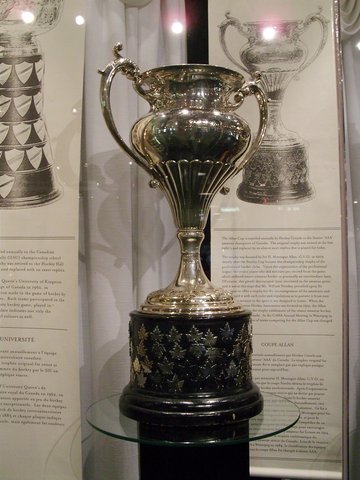IMAGE INFORMATION
EditThe Allan Cup is the trophy awarded annually to the national senior amateur men’s ice Hockey champions of Canada.
It was donated by Sir Montague Allan of Ravenscrag, Montreal, and has been competed for since 1909.
In 1908, a split occurred in the competition of ice Hockey in Canada. The top amateur teams left the Eastern Canada Amateur Hockey Association, which allowed professionals, to form the new Inter-Provincial Amateur Hockey Union (IPAHU), a purely amateur league. The trustees of the Stanley Cup decided that the Cup would be awarded to the professional ice champion, meaning there was no corresponding trophy for the amateur championship of Canada. The Allan Cup was donated in early 1909 by Montreal businessman and Montreal Amateur Athletic Association president Sir H. Montagu Allan to be presented to the amateur champions of Canada. It was to be ruled like the Stanley Cup had, passed by champion to champion by league championship or challenge. Three trustees were named to administer the trophy: Sir Edward Clouston, President of the Bank of Montreal, Dr. H. B. Yates of McGill University, (donor of the Yates Cup to the Intercollegiate Rugby Union in 1898) and Graham Drinkwater, four-time Stanley Cup champion.
The trophy was originally presented to the Victoria Hockey Club of Montreal, members of the IPAHU, to award to the champions of the IPAHU. The first IPAHU champion, and by extension, first winner of the Cup was the Ottawa Cliffsides Hockey Club. After the season, the Cliffsides were defeated in the first-ever Allan Cup challenge by the Queen’s University Hockey club of Kingston, Ontario.
In the early years, trustees of the Cup quickly came to appreciate the difficulties of organizing a national competition in so large a country. In 1914, at the suggestion of one of the trustees, Claude Robinson, the Canadian Amateur Hockey Association (CAHA) was formed as a national governing body for the sport. One of the CAHA's first decisions, in 1915, was to replace the challenge system with a series of national playoffs. Starting in 1920, the Allan Cup champion team would represent Canada in amateur play at the Olympics and World Championships. This was discontinued in the 1960s with the introduction of the Canadian national team.
In 1928 the trustees turned over responsibility for the Cup to the CAHA. By 1951, many senior teams had become semi-professional or professional. In 1951, the CAHA set up a "major league" of competition from the semi-pro and professional senior leagues. The leagues would no longer compete for the Allan Cup, but would compete for the new Alexander Cup. The Allan Cup would be competed for on a more purely amateur basis from teams in smaller centres of Canada. The major league concept broke up by 1953, and the Alexander Cup competition was retired after 1954.
Since 1984 the Allan Cup has been competed for by teams in the Senior AAA category. Although interest in senior ice Hockey has diminished over its history, the Cup retains an important place in Canadian ice Hockey. The Cup championship is determined in an annual tournament held in the city or town of a host team, playing off against regional champions.
The Cup has been won by teams from every province and from the Yukon, as well as by two teams from the United States which played in Canadian leagues. The city with the most Allan Cup championships is Thunder Bay with 10, including four won as Port Arthur before the city's amalgamation.
The original Cup has been retired to the Hockey Hall of Fame, and a replica is presented to the champions each year.
The cup was almost the Grey Cup. Albert Henry George Grey, the popular Governor General of Canada from 1904 to 1911, planned for the Grey Cup to be awarded to the top Canadian senior Hockey team, but was trumped by Sir Montague Allan, who donated the Allan Cup. Undeterred, Grey declared that his hardware should be awarded to the winner of the nation's rugby football championship


























